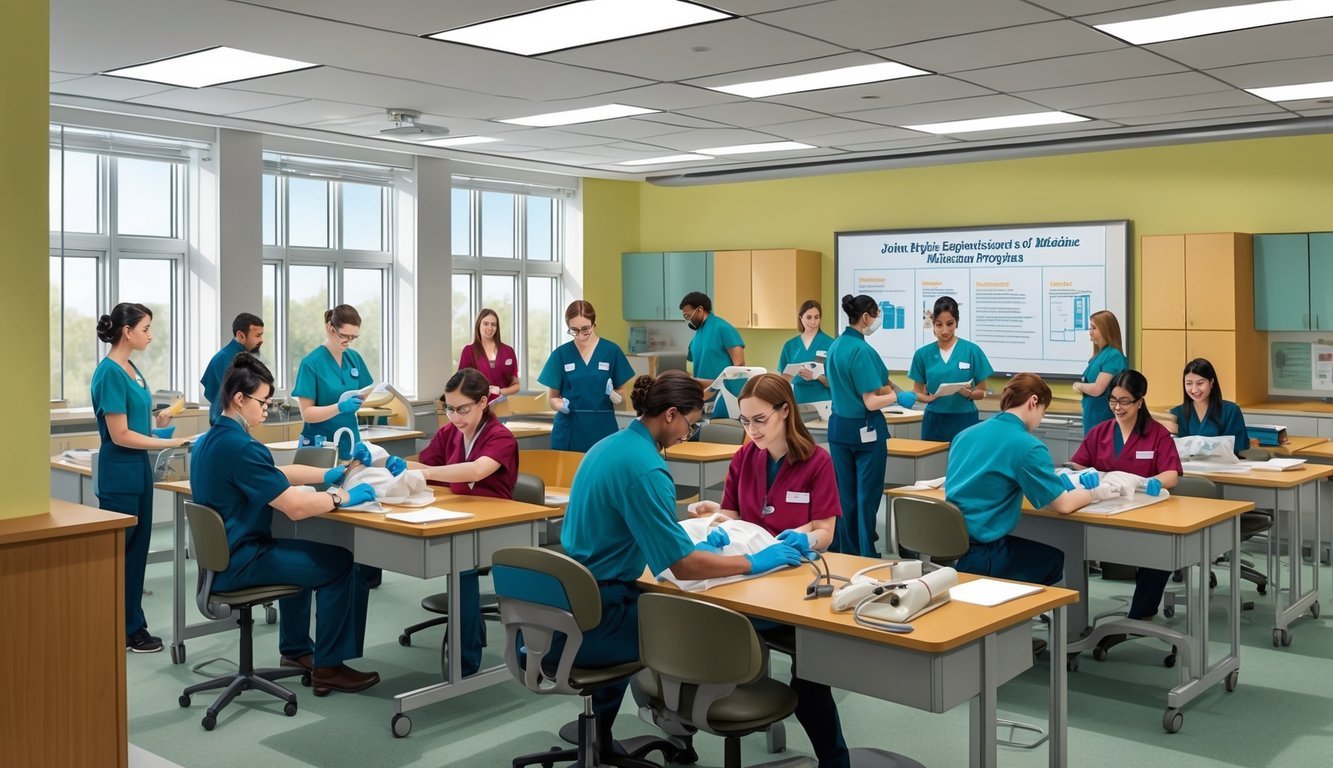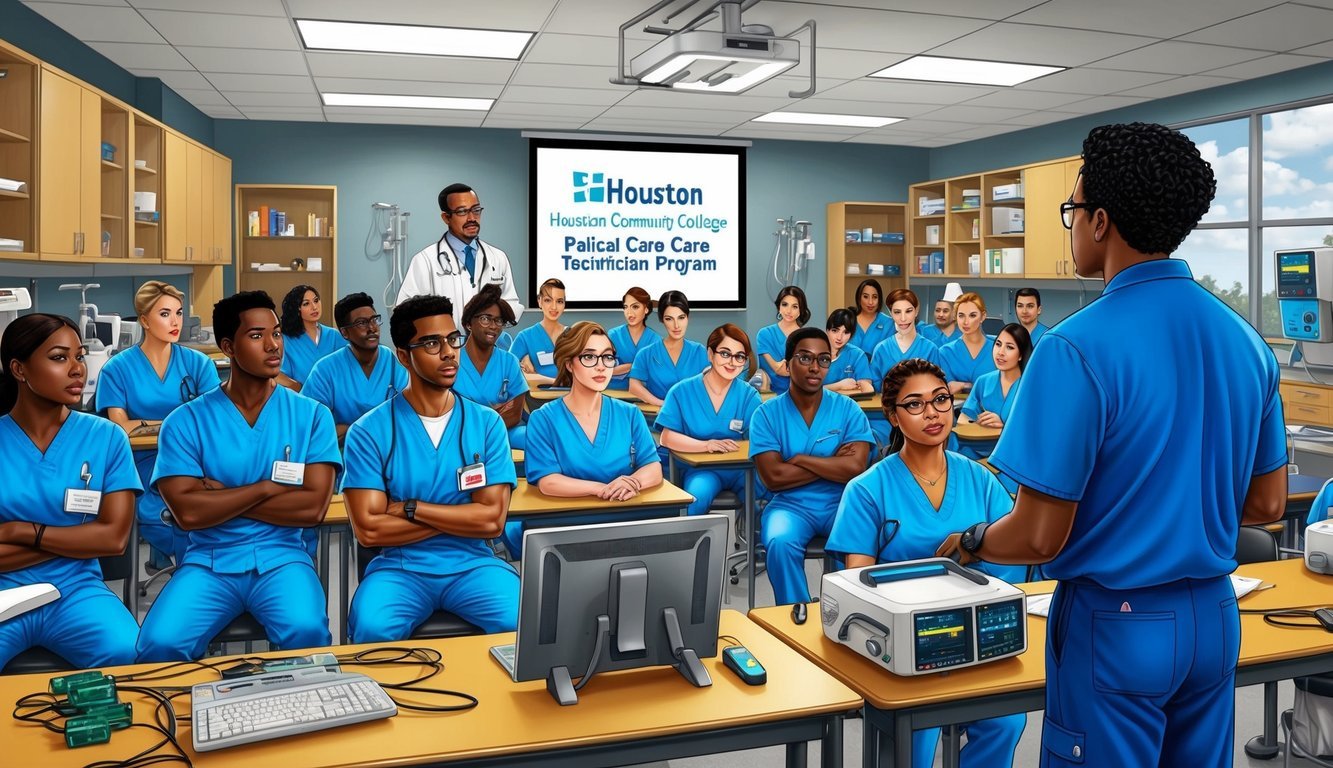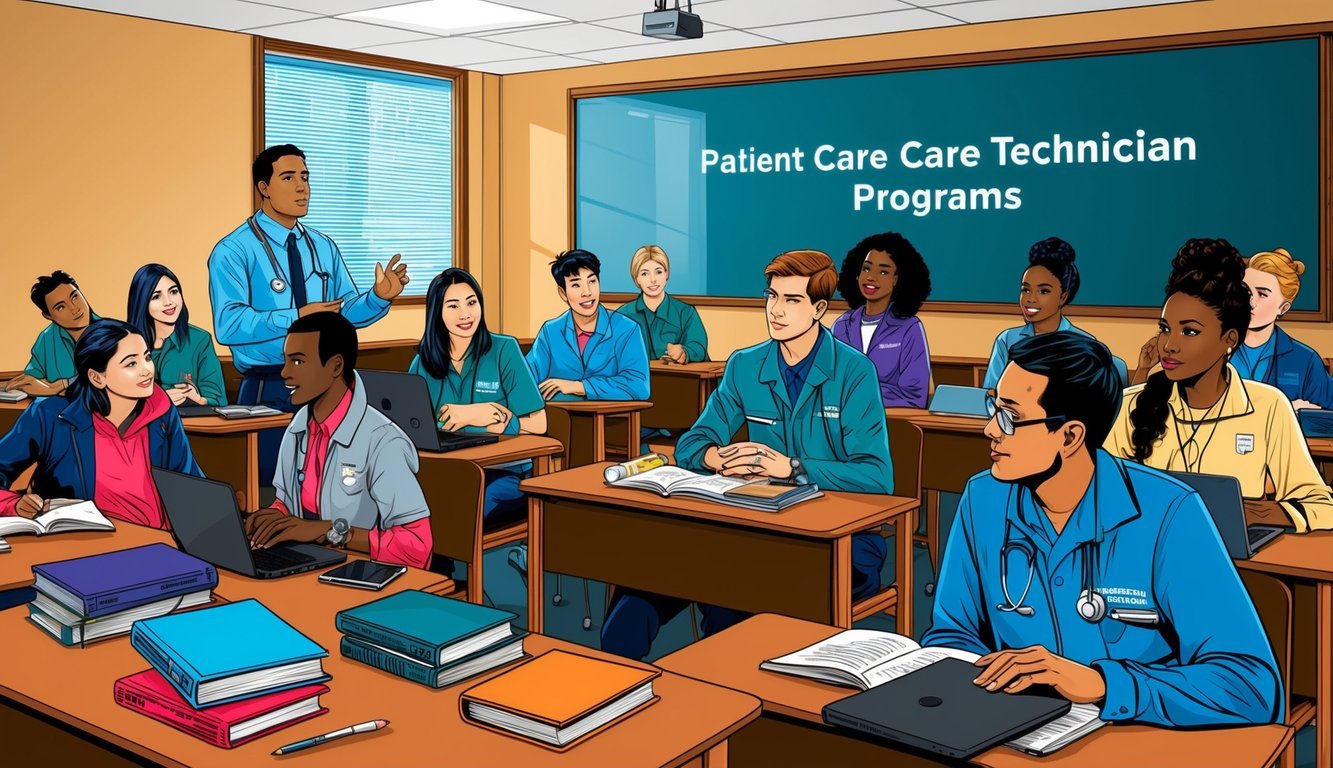“`xml
Thinking about jumping into a fulfilling healthcare career? Becoming a patient care technician might just be your ticket! These dedicated professionals team up with both patients and medical staff to deliver vital care and support.
Pretty exciting, right?

There are plenty of online programs for patient care technicians that fit into your busy life. These courses cover everything from basic patient care and medical terminology to critical clinical skills.
With the right training, you’ll be all set to impact people’s lives as a patient care tech.
1) Johns Hopkins University School of Medicine

Hey, looking to kick off your journey as a patient care technician? Johns Hopkins could be just what you’re after! Their solid program prepares you to thrive in this meaningful career.
You’ll dive into hands-on training and crucial skills that’ll make you a healthcare champ.
Plus, if you’re keen on upping your game, check out some of the top pharmacy technician certifications to expand your skill set.
With Johns Hopkins on your resume, you’ll be ahead of the pack!
You’ll learn from some of the best in the business.
Their Patient Care Technician program is top-notch.
Expect hands-on experience in a leading medical center.
The program covers all the essentials: from taking vital signs to assisting with daily activities and communicating effectively with patients.
You’ll get the hang of medical terms and hospital procedures, too.
What’s neat is that Johns Hopkins offers both day and night shifts for their Patient Care Technician roles.
It’s all about finding what works best for your just-right schedule!
Once you finish the program, you’ll be ready to step into a rewarding career as a Patient Care Tech.
And let me tell you, having Johns Hopkins on your resume is a major win in today’s job market.
2) Cleveland Clinic Center for Health Education

Want to learn from one of the globe’s premier hospitals? The Cleveland Clinic has fantastic internal education programs for aspiring healthcare pros like you!
You’ll get to work alongside talented doctors and nurses as you find your footing.
Their Center for Health Professions Education runs various training programs, including for patient care technicians.
Whether you’re just starting out or you’re a bit more seasoned, there’s something here for everyone.
Don’t forget to explore their education programs page to see what suits you best!
Cleveland Clinic has a long history in training healthcare workers, so you know you’re getting quality education to start your career on the right foot.
3) Mayo Clinic School of Health Sciences
Mayo Clinic School of Health Sciences offers stellar training for those looking to become patient care techs.
With over 140 programs in allied health fields, you’re in good hands!
Though they don’t directly grant degrees, partnering schools can help you earn one while you gain invaluable hands-on experience in a world-class medical environment.
Mayo Clinic is known for using simulation in education, which gives you practical scenarios to prepare for real patient interactions.
Who wouldn’t want to learn by doing?
After finishing your training, you might even find employment at Mayo Clinic—they often tend to hire their graduates for patient care tech roles, which is a great perk!
You’ll also pick up specialized knowledge, such as patient blood management.
This knowledge certainly sets you apart in the healthcare landscape.
4) Houston Community College Patient Care Technician Program

Want to dive into a Patient Care Technician career? Look no further than Houston Community College (HCC).
Their program prepares you with the essential skills for healthcare settings.
At HCC, you’ll kick things off by training to be a Certified Nurse Aide.
This is your starting block on the PCT journey.
You’ll learn about patient care and daily support tasks.
Then it’s on to EKG training, where you’ll master taking electrocardiograms and understanding heart rhythms—super handy in hospitals!
The program doesn’t stop there.
You’ll also get phlebotomy training, allowing you to become skilled at drawing blood and managing samples.
These are crucial parts of being a PCT.
HCC’s program is flexible, letting you choose classes that fit your lifestyle.
Plus, they offer support for students with disabilities—how great is that?
Once you’re certified, you’ll be ready to jump into the job market, whether in hospitals, nursing homes, or other healthcare facilities.
It’s a fantastic way to kickstart your career!
5) University of Florida Health Shands Hospital
UF Health Shands Hospital boasts a fantastic patient care technician program that provides hands-on training at one of Florida’s top medical centers.
During the program, you’ll learn crucial skills like taking vital signs, aiding with daily activities, and communicating effectively with patients.
Experience like this is a game-changer!
This hospital is recognized nationally for excellence in several specialties, meaning you’ll be learning from some of the best in the field.
Plus, graduating from UF Health Shands gives your career a real boost.
Employers are impressed by the caliber of training its grads receive.
You’ll also work with cutting-edge medical technology, ensuring you stand out when job hunting.
The mix of classroom-based learning and clinical practice means you’ll leave the program feeling confident and ready to jump into your first job.
UF Health Shands is celebrated for its excellent patient care, teaching you the importance of professionalism and empathy in healthcare.
Benefits of Becoming a Patient Care Technician
Choosing to step into this field opens doors to hands-on healthcare experience and solid job prospects.
You’ll work closely with patients while cultivating the skills you need for a bright future.
Hands-On Experience
As a patient care tech, you’ll jump straight into the action.
You’ll learn vital skills like taking vital signs, helping patients move, and assisting with daily activities.
This real-world practice is invaluable.
Working alongside nurses and doctors provides an insider’s view of the medical field.
It’s a fantastic opportunity if you’re considering advancing in your healthcare career later on.
Many PCT programs include clinical rotations, letting you experience different healthcare settings.
You might find your niche in hospitals, clinics, or nursing homes—it’s all about what vibes with you!
Job Stability and Growth
With healthcare jobs booming, this means tons of opportunities for patient care techs.
The need for care increases as the population ages, ensuring steady demand for your skills.
You’ll find PCT positions available in hospitals, long-term care facilities, and home health agencies, giving you plenty of flexibility about where you work.
There’s plenty of room to grow in this career path.
You might decide to specialize in areas like dialysis or emergency care.
Alternatively, many PCTs move on to nursing or other healthcare roles.
Trust me—it’s an exciting starting point!
Most employers provide on-the-job training, letting you continue to grow and hone your skills.
It’s a career where learning is a continuous process, which is pretty awesome.
Essential Skills for Patient Care Technicians

To excel as a patient care technician, you’ll need a blend of people skills and medical know-how.
These skills help you provide exemplary care while collaborating effectively with patients and medical staff.
Communication Skills
Being a good listener and communicator is essential as a patient care tech. Clear communication helps when talking to patients, their families, and other healthcare professionals.
It’s important to explain things in simple terms.
Patients might be anxious or confused, so patience and kindness go a long way.
Plus, you’ll need to keep clear notes on patient care, ensuring information is accurately communicated.
Empathy is a must.
Understanding how patients feel and showing them genuine care helps build trust and comfort.
Technical Proficiency
You’ll also need to bring hands-on skills to the table.
Basic nursing skills are crucial; here’s what you should know:
- Taking vital signs
- Helping patients move safely
- Providing basic wound care
- Assisting with personal hygiene
You might even learn how to draw blood and set up EKG machines.
Comfort with medical equipment and digital records is becoming increasingly important.
Stay updated on safety regulations and infection control techniques.
These skills are part of your daily routine in keeping patients safe and healthy.
Choosing the Right Program for You

Picking the right patient care technician program is a big step.
You’ll want to consider a few key points to find the perfect fit for your goals and needs.
Accreditation Importance
Accreditation matters.
It shows a school meets specific quality standards. Accredited programs are generally more recognized by employers and certification boards.
Look for programs endorsed by organizations like the Commission on Accreditation of Allied Health Education Programs (CAAHEP).
These programs often provide better training and job opportunities.
Make sure the program is recognized in your state, as this can influence your job prospects after graduation.
Curriculum and Training
The classes and hands-on experience you receive are vital.
A solid program should cover the basics like anatomy, medical terms, and patient care skills.
Look for coursework that includes:
- Taking vital signs
- Assisting with daily activities
- Drawing blood
- Performing EKGs
Hands-on training is crucial, so ensure the program has ample practical opportunities, whether in labs or through student internships at hospitals or clinics.
Extra certifications like CPR or phlebotomy can make you more attractive to future employers, so keep an eye out!
Frequently Asked Questions

Thinking about patient care technician programs? They’re an exciting way to kick-start your healthcare career.
Let’s tackle some common queries about these programs and the profession.
What are the top patient care technician programs available online?
If you’re looking for flexibility, online PCT programs are a great option. Lehman College has a solid hybrid program that mixes online study with in-person practice, allowing you to sharpen your EKG and phlebotomy skills.
How long does it typically take to complete a patient care technician program?
Most PCT programs wrap up in around 3-6 months.
If you’re feeling particularly motivated, some accelerated options can be completed in as little as 8 weeks.
On the flip side, part-time programs might stretch to a year.
What’s the earning potential for a patient care technician?
As a PCT, you can expect to earn a decent wage.
The average salary hovers around $34,000 annually, but your pay may vary based on your experience, location, and workplace.
Which certifications are essential for a patient care technician?
Getting certified is proof that you’ve got the skills employers are looking for.
Key certifications include:
- Certified Patient Care Technician (CPCT)
- Certified Nursing Assistant (CNA)
- Basic Life Support (BLS)
- Phlebotomy Technician
How do patient care technician programs compare to certified nursing assistant (CNA) training?
Great question! PCT programs cover more advanced skills beyond CNA training, such as:
- EKG monitoring
- Phlebotomy
- Catheter care
PCT programs tend to take a bit longer, but they can open up more job opportunities in the long run.
Can I find patient care technician training for free, and if so, how?
Free PCT training isn’t super common, but there are some options out there.
Check to see if your local hospital has free job training programs.
Sometimes, employers will even cover your training costs if you’re willing to work for them afterward.
“`

